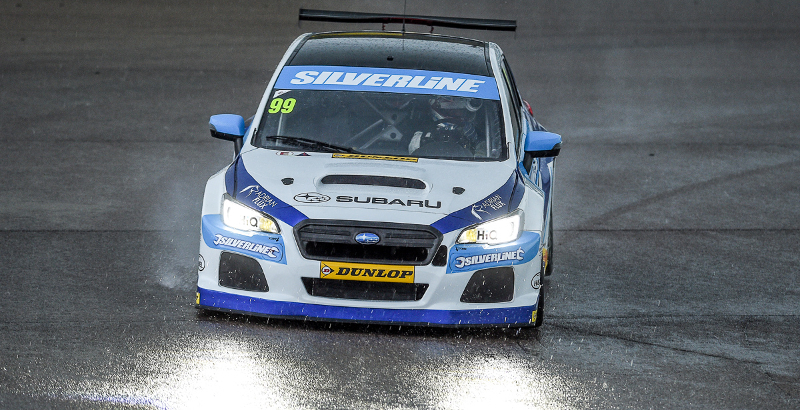Subaru’s Jason Plato says that he ‘loved’ qualifying in the wet for the British Touring Car Championship round at Rockingham, despite fighting against his car in the torrential conditions.
Plato put his Subaru Levorg GT in fourth on the grid for the first of Sunday’s races at Rockingham, even though it was only his second session in the wet in rear-wheel drive machinery.
The double champion had to endure an off through the gravel at Gracelands half-way through, which gave him an opportunity to understand how his rear-wheel drive car reacted in such conditions.
“I loved that session,” said Plato to TouringCars.Net. “We were quick, the car was working well, but I just couldn’t get through Turns 9 and 10. There was a river of water there and in a rear-wheel drive if you’ve got lock on, you’ve got to be off the throttle.
“Now I know that rear-wheel drive cars don’t like standing water!”
Plato praised TOCA for stopping the session at the mid-point of the session, citing the dark conditions as being particularly challenging to drive through.
“Because it was so dark, visibility wasn’t very good and you couldn’t see where the standing water was. TOCA did the right thing, because we couldn’t see. Normally if it’s just raining it’s not as dark as that, and if it’s too wet we’ll stop. They did the right thing.”
Looking ahead to Sunday, Plato, who has team-mate Colin Turkington one place behind him on the grid, believes that he and his BMR team are in good shape for the races.
“Out on the track I think our car was good, and also we’re kinder on tyres. The front-wheel drive cars are good when there’s lots of standing water, but [in the dry] they’ll hurt their tyres and we won’t necessarily, so I think come rain or shine we’ll be competitive.”
When asked for comment on the ongoing saga between Team BMR and TOCA about boost levels, Plato also added that whilst he and the team agree with the principles being employed by the championship organisers, they don’t agree with the input data being used.
“Our position is clear; the team have made a statement and that’s our position. We have no interest in discussing it anymore because we’ve said what we believe. We have been respectful.
“There’s some things I can’t talk about because they’re confidential, but for the first time last Monday it was revealed at a meeting how they calculate all of the boost and equalisation. Whilst we agree with the calculations and the mathematics surrounding that, and we have to say it’s remarkably accurate, what we don’t agree with is the datasets they’re using. But that’s just our opinion.
“We think that the dataset they’re using needs to evolve to give a better picture if the common goal is to deliver on-track speed equivalency. If that isn’t the common goal, then fine, but I think that’s what we all want.
“I don’t want the best engine on the grid; we want to all be the same on the straights.
“We’ve made our position clear.”

